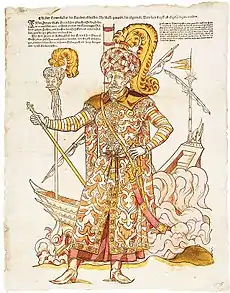Müezzinzade Ali Pasha
Müezzinzade Ali Pasha (Turkish: Müezzinzade Ali Paşa; also known as Sofu Ali Pasha or Sufi Ali Pasha or Meyzinoğlu Ali Pasha; died 7 October 1571) was an Ottoman statesman and naval officer. He was the Grand Admiral (Kapudan Pasha) in command of the Ottoman fleet at the Battle of Lepanto, where he was killed in action. He also served as the governor of Egypt from 1563 to 1566.
Müezzinzade Ali Pasha | |
|---|---|
| Died | 7 October 1571 Gulf of Patras, Ionian Sea |
| Allegiance | |
| Service/ | |
| Years of service | c. 1530–1571 |
| Rank | Grand Admiral, Governor-general |
| Battles/wars | Ottoman–Habsburg wars |
| Other work | Governor of Ottoman Egypt |
Background
He was the son of a muezzin of possible Albanian descent, hence his epithet Müezzinzade ("son of a muezzin"). He was a favorite of Sultan Selim II and of the women of the seraglio who admired his voice as a muezzin, and he married one of Selim II's daughters.
He would rise in Ottoman society as a member of the Janissaries.[1][2]
From 1563 to 1566, Ali Pasha served as the Ottoman governor of Egypt.[3] He was reportedly a very ascetic Sufi man, wearing only "coarse woolen clothes" and paying many visits to the tombs of saints in the City of the Dead necropolis in Cairo.[4][5]
Ottoman conquest of Cyprus
Ali Pasha, with a fleet eventually numbering 188 galleys, fustas, transports and other ships, carried the main land force, commanded by Lala Mustafa Pasha, for the Ottoman invasion and conquest of Cyprus from Constantinople on 16 May 1570 to Cyprus, where they landed on 3 July. While Lala Mustafa commanded the eventual capture of the island from Venice, Ali Pasha took the bulk of his fleet to Crete and then to Morea, thereby effectively preventing any Christian relief fleet from coming to the aid of the besieged defenders of Cyprus.
Ali Pasha was accused of brutally torturing the captain of the Kingdom of Cyprus Marco Antonio Bragadin.[6]
Battle of Lepanto and death

Ali Pasha was Grand Admiral, or Kapudan Pasha, of the Ottoman naval forces at the Battle of Lepanto on 7 October 1571.[7][8] Selim had entrusted him with one of the most precious possessions of the Ottoman Sultans, the great "Banner of the Caliphs", a huge green banner heavily embroidered with texts from the Qur'an and with the name of Allah emblazoned upon it 28,900 times in golden letters. It was intended to provide an incentive for him and his men to do their best in battle.
Ali Pasha initiated the battle, however his reasoning for doing so has been disputed. Some believe that he may have been encouraged by the Holy League's smaller numbers and underestimated the Christians, while others believe he may have feared displeasing the Sultan who had previously commanded him to engage the enemy.[1] Others however point to his lack of naval experience as what caused the defeat at Lepanto.[2] His flagship, the galley Sultana, battled head-to-head with Don Juan's flagship La Real, was boarded and, after about one hour of bloody fighting, with reinforcements being provided to both sides by other galleys in their respective fleets, was captured. In the ensuing battle, Ali Pasha was slain and his head was then displayed upon a pike.[7][9] This, and the capture of the Banner of the Caliphs by La Real, led to a collapse in Turkish morale, greatly contributing to their rout in the battle.
His subordinate Occhiali, who had led a successful flank at Lepanto, would replace him as Kapudan Pasha.[7]
Literature
References
- Brotton, Jerry (February 2017). "The battle of Lepanto: when Ottoman forces clashed with Christians". HistoryExtra. Retrieved 2020-11-02.
- Archivum Ottomanicum. Vol 6. Indiana University: Mouton. December 1, 2010 [1980].
- Angus Konstam (1 January 2003). Lepanto 1571: The Greatest Naval Battle of the Renaissance. Osprey Publishing. pp. 15–16. ISBN 978-1-84176-409-2.
- M. W. Daly; Carl F. Petry (10 December 1998). The Cambridge History of Egypt. Cambridge University Press. p. 40. ISBN 978-0-521-47211-1.
- Michael A. Cook; Asad Ahmed; Behnam Sadeghi; Michael Bonner (21 March 2011). The Islamic Scholarly Tradition: Studies in History, Law, and Thought in Honor of Professor Michael Allan Cook. BRILL. ISBN 978-90-04-19435-9.
- Tarver, H. Micheal; Slape, Emily (2016-07-25). The Spanish Empire: A Historical Encyclopedia [2 volumes]: A Historical Encyclopedia. ABC-CLIO. ISBN 978-1-61069-422-3.
- Hanson, Victor Davis (2007-12-18). Carnage and Culture: Landmark Battles in the Rise to Western Power. Knopf Doubleday Publishing Group. ISBN 978-0-307-42518-8.
- Tucker, Spencer C. (2019-08-31). Middle East Conflicts from Ancient Egypt to the 21st Century: An Encyclopedia and Document Collection [4 volumes]. ABC-CLIO. ISBN 978-1-4408-5353-1.
- Contadini, Anna; Norton, Dr Claire (2013). The Renaissance and the Ottoman World. Ashgate Publishing, Ltd. ISBN 978-1-4724-0991-1.
| Political offices | ||
|---|---|---|
| Preceded by Kara Şahin Mustafa Pasha |
Ottoman Governor of Egypt 1563–1566 |
Succeeded by Mahmud Pasha |
| Military offices | ||
| Preceded by Piyale Pasha |
Kapudan Pasha 1569–1571 |
Succeeded by Uluç Ali Reis |